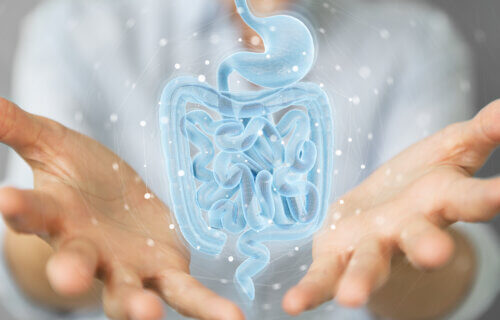Gut health is a complex, yet highly popular topic on social media and in the medical community these days. In general, your gut is always keeping busy. When you eat, food takes a trip down a winding road that ends with you in the bathroom. In theory, things are this simple yet in reality, it can get really convoluted.
The gut is an incredibly important organ system that, when healthy, can help you ward off infections and an array of chronic diseases. You may have heard the phrase that “all disease starts in the gut.” While not every disease does, most metabolic conditions that people suffer from are thought to be influenced by chronic gut inflammation.
Several factors can prevent your gut from helping you prevent infection and disease, many of which are lifestyle-related. Stress, insufficient fiber intake, and lack of exercise are some of the most common reasons. Sites like TikTok and Instagram are saturated with tons of posts about the “best” things to do for a healthy gut. As a dietitian, I’ve found some of the information to be helpful. Other times, however, I’ve come across blatant misinformation. To help simplify things, here’s a list of three do’s and don’ts for a healthy gut:
Do:
Eat both prebiotics AND probiotics
- Probiotics are live bacteria that help maintain proper microbial balance in the gut. I’m sure you’ve heard all about them and the importance of probiotic-rich foods like yogurt, kimchi, or kefir. Less discussed is the importance of eating prebiotic-rich foods too. Sometimes it can be difficult to know the difference, but an easy way to explain it is that prebiotics are fibers that “feed” the gut while probiotics are the beneficial bacteria.
Eat a diverse diet with lots of plants
- You’ve heard it plenty of times before, so this is nothing new. There’s a lot of reasons you’re consistently told to eat fruits and vegetables, but it’s important for your gut microbiome to be introduced to an array of fruits, veggies, nuts, seeds, and whole grains to maintain optimal health. Research has consistently shown this to be the case, including one study that highlighted the importance of eating broccoli for a healthy gut. Moreover, plant-based foods contain fiber, which is good for promoting healthy bowel movements. Additionally, when fiber is fermented it produces short-chain fatty acids that act as prebiotics.
- If you struggle with IBS, IBD, or another gut condition, you may not be able to tolerate these foods. It’s important to work with your doctor or dietitian to focus on what you can tolerate and get you to a better place to increase the diversity of foods you can have.
Prioritize high-quality sleep
- Have you ever noticed that when you get less sleep, you make poorer diet choices? It’s no coincidence. Getting in the zzz’s is imperative for optimizing your digestion and preventing your gut environment from disruption by reducing stress and keeping hormones balanced — including the ones that regulate your appetite.

Don’t:
Eat the same foods all the time
- Earlier, the importance of eating a varied diet was touched on. It makes sense that eating the same foods all the time isn’t good for your gut because different foods have different unique properties that help you maintain a healthy gut. If you don’t switch things up, your gut microbiome may not be getting the diversity it needs to thrive. This isn’t to say you need to eat three completely different meals every single day, but maybe switch up one grain or vegetable every week.
Eat quickly
- Ever rushed out the door for school, work, or soccer practice with a yogurt in hand? We’ve all been there at some point. You can’t always avoid the chaos of life, but prioritizing the act of intentional eating can do wonders for your digestion. Chewing your food is the only way for your body to break down food physically. After that, everything goes through reactions. Chewing thoroughly is one of the best things you can do for your gut, as it gives your body time to align your hunger cues with your fullness cues and makes it easier for your system to do its work.
Skip the water
- Somewhat related to the last tip, it can be hard to remember to stay hydrated when you’re having a busy day. If you are one of those people that find it difficult, try to find ways that work for you to remember to get in enough H2O. It could be a phone alarm, or one of those water bottles that have words of encouragement for each line you drink to. Not only can a lack of fiber lead to constipation, but so can dehydration. Getting enough fluids helps prevent this, as well as organ dysfunction, detoxification, and immunity (which are all gut-health related too!).

Bottom Line:
Everyone is still learning about the gut and its many functions, but what we know so far is that it’s way more involved in overall health than we ever could’ve expected. However, sticking to the basics without overcomplicating things can help you establish a solid foundation rooted in reducing stress, getting good sleep, and eating your fruits and veggies!

